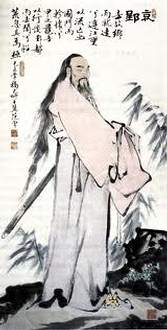The creation of Li Sao is not only deeply rooted in the social reality, but also full of romantic fantasies, where the real figures, historical figures, and myths figures are intertwined; where the kingdom of heaven and earth, dreamland and reality are interwoven. It represents a spectacular, unusual, and gorgeous imaginary world, thus producing strong artistic charm. That poem was a?? first of its kind in the history of Chinese literature. There are some other major literature works of Qu Yuan: |

| ?????? Jiu Ge, a set of short poems published in the Chu Ci. Though it is called Jiu Ge, it actually includes eleven pieces: Dong Huang Tai Yi, Yun Zhong Jun, Xiang Jun, Xiang Fu Ren, Da Si Ming, Shao Si Ming, Dong Jun, He Bo, Shan Gui, Guo Shang, Li Hun. Jiu Ge is the collection of the sacrificial songs polished by Qu Yuan and is one of the finest examples of shamanic poetry ever created in ancient China, featuring mythological content and elegant imagination. Jiu Ge is different from the rest of Qu Yuan's works. Except for Guo Shang, the pieces for various gods are either written as dialogs or in prose style, to express the love between gods that have aspects of human nature, and humans. This appears to be style of the love songs of that era. Qu Yuan’s authorship of Jiu Ge is often questioned. |
?????? Tian Wen
?????? Jiu Zhang (Songs of the Soul, consisting of 9 pieces)
?????? Yuan You (Far Off Journey)
?????? Pu Ju
?????? Yu Fu (Song of the Fisherman) This poem presents a conversation between Qu Yuan and a fisherman on a marshbank; when Qu Yuan speaks of his grief, the fisherman responds is a Canglang Song, which states that when government is clean it is fine to work with it, but when it becomes dirty one should be happy to leave it. |